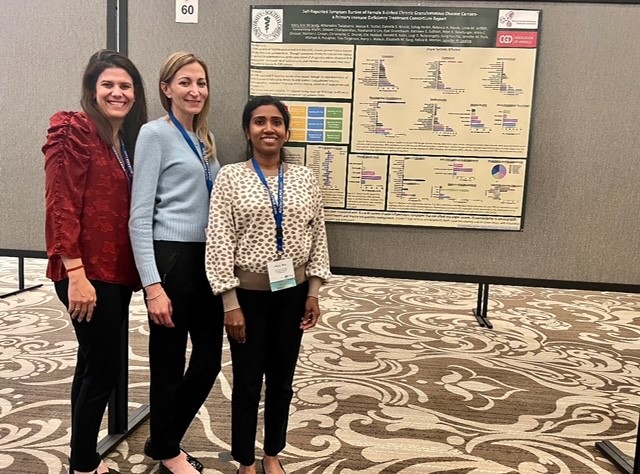
-
Understanding primary immunodeficiency (PI)

Understanding PI
The more you understand about primary immunodeficiency (PI), the better you can live with the disease or support others in your life with PI. Learn more about PI, including the various diagnoses and treatment options.
-
Living with PI
-
Addressing mental health
-
Explaining your diagnosis
- General care
- Get support
- For parents and guardians
-
Managing workplace issues
- Navigating insurance
-
Traveling safely

Living with PI
Living with primary immunodeficiency (PI) can be challenging, but you’re not alone—many people with PI lead full and active lives. With the right support and resources, you can, too.
-
Addressing mental health
-
Get involved

Get involved
Be a hero for those with PI. Change lives by promoting primary immunodeficiency (PI) awareness and taking action in your community through advocacy, donating, volunteering, or fundraising.
-
Advancing research and clinical care
-
Research Grant Program
-
Consulting immunologist
-
Diagnosing PI
-
Getting prior authorization
-
Clinician education
-
Survey research
-
Participating in clinical trials

Advancing research and clinical care
Whether you’re a clinician, researcher, or an individual with primary immunodeficiency (PI), IDF has resources to help you advance the field. Get details on surveys, grants, and clinical trials.
-
Research Grant Program
Update
Prior research studies have shown that female X-linked carriers of chronic granulomatous disease (CGD) – mothers, daughters, sisters, aunts, and grandmothers – exhibit some symptoms related to the disease. The most common are discoid lupus (which causes round lesions on the skin), mouth ulcers, and joint pain. But a new study that allowed X-linked carriers of CGD to self-report their symptoms reveals a broader range of health problems associated with carrier status, requiring appropriate diagnosis and treatment.
Dr. Jennifer Leiding, adjunct associate professor at Johns Hopkins University and attending physician at Orlando Health, Arnold Palmer Hospital for Children, described the results of the study, “Self-Reported Symptom Burden of Female X-linked Chronic Granulomatous Disease Carriers,” in a recent Immune Deficiency (IDF) Forum.
Leiding, along with colleague Dr. Mary Ann Miranda, a physician in the Division of Allergy and Immunology at the University of South Florida, led the CGD research study in collaboration with the Chronic Granulomatous Disease Association of America (CGDAA) and the Primary Immune Deficiency Treatment Consortium (PIDTC).
“Our objective in this study was to identify the different symptoms that patients had and to also really put a flag in the ground to say that being an X-linked carrier is its own disease and that it’s time that we recognize it as its own entity because it’s going to need its own treatment, its own recommendations, its own follow-up and that’s what we hope to gain when we publish this report,” said Leiding.
CGD, a rare primary immunodeficiency (PI), occurs when a person’s white blood cells do not produce enough superoxide. Superoxide helps a subset of these cells kill specific types of germs. Low or no superoxide production makes a person vulnerable to recurrent and/or severe infection by certain bacteria and fungi, causes the formation of granulomas (small masses of inflammation), and leads to high rates of inflammatory and autoimmune disease, especially in the gut (about 50 percent of patients have CGD colitis), lungs, and liver.
“Pretty much every organ system is affected with some frequency with either autoimmune or inflammatory disease,” said Leiding.
Changes in any one of six genes cause CGD, with 66 percent of cases being X-linked and the remainder, autosomal recessive. X-linked means that women are carriers of the CGD gene variant and autosomal recessive means that both parents are carriers of the CGD gene variant.
When an X-linked CGD carrier mother has children, her sons have a 50 percent chance of being affected by CGD, while her daughters have a 50 percent chance of being carriers.
When two parents who are autosomal recessive CGD carriers have children, each parent is a carrier, and their children have a 25 percent chance of being affected, a 50 percent chance of being a carrier, and a 25 percent chance of being unaffected.
Over the last several years, several studies have shown that in addition to passing on the CGD gene to their children, X-linked carriers can suffer symptoms themselves. Those include:
Susceptibility to CGD-related infections.
Immune dysregulation and autoimmunity.
Systemic lupus/discoid lupus.
Mouth ulcers.
Colitis.
Arthritis.
Immune abnormalities.
Hypogammaglobulinemia (low antibody levels).
Increased cell quantities possibly correlating to immune dysregulation.
Lower quality of life scores.
Increased rates of anxiety, higher rates of depression, lower self-esteem.
Leiding said her team’s recently completed CGD carrier study describes the symptoms of carriers based on information provided by the carriers themselves. The 57-question, IRB-approved survey was administered through the CGDAA and yielded 171 respondents. Data gathered included demographics, method of diagnosis, medical history, utilization of medical care, and treatments.
Though the vast majority of participants rated their health as good, about 34 persons experienced impairments in daily living activities like showering or cleaning the house, and a subset reported not being able to work a job to their full capacity. Both groups reported health challenges like fatigue and pain, including painful joints, psychiatric symptoms, some systemic conditions, and sleep disturbance.
Though a high number of respondents said they had no infections, those that did experience skin disease, pneumonia, cellulitis (an infection of the skin), deep infections like deep tissue abscesses, and lymph node infections, said Leiding.
“A fair amount of patients were also receiving prophylactic agents, so we asked specifically about antibiotics, and around 25 to 30 percent were receiving antibiotics, a small number were receiving antifungals, and a very small number were receiving interferon-gamma prophylaxis,” said Leiding.
The survey also asked about symptoms the carriers had in relation to specific organ systems. The researchers attempted to find out if the carriers had the same health problems found in those diagnosed with CGD.
Of those carriers who had a skin disease, about 50 percent said they had a photosensitive rash (a rash that intensifies if exposed to sunlight). In addition, some had delayed wound healing, discoid lupus, alopecia (loss of hair), and cystic acne, all common in CGD.
When queried about gastrointestinal problems, also common in those with CGD, a large number of carriers had oral ulcers, a smaller number had inflammatory bowel disease (also known as CGD colitis), irritable bowel syndrome, and chronic diarrhea.
While pulmonary symptoms weren’t common, the majority of carriers who did have them reported pneumonia but also interstitial lung disease, pulmonary nodules, pleurisy (inflammation of the covering of the lungs), and granulomas in the lungs – all found in persons with CGD as well.
In the area of musculoskeletal/neurologic symptoms, a large group reported chronic headaches and painful joints, and arthritis, with subgroups experiencing lupus, thyroid disease, Raynaud’s phenomena, fibromyalgia, and other autoimmune conditions, similar to that experienced by CGD patients.
Survey respondents also relayed significant miscarriage rates, bleeding disorders, lymphadenopathy (chronic lymph node inflammation), and chronic dry eye.
In questions related to mental health, around 70 percent reported anxiety and a high amount of depression, and some suffered from panic attacks and post-traumatic stress disorder (PTSD).
“It’s hard to know what to attribute this to,” said Leiding of the mental health results. “Is this a genetic susceptibility to these disorders or the fact that they are living with a chronic disease or the fact that they are family members of children, in a lot of cases, that have a chronic disease that could be contributing to all of this?”
Leiding said this study bears out that X-linked female CGD carriers can have CGD-related infections, and many require the use of anti-microbial prophylaxis. Every organ system is affected in some way with the most common ones being autoimmune/rheumatic and gastrointestinal disease. In addition, there are high amounts of psychiatric symptoms.
“The major points I want to make when we eventually publish this manuscript is, again, that this is its own entity and that many of our patients need to be followed by specialty care,” said Leiding, adding that X-linked CGD carriers should seek treatment from specialists such as immunologists, hematologists/oncologists, and rheumatologists.
“We do have that data in the survey and we’re still in the process of analyzing it as far as how many carriers are following with subspecialists, but we want to encourage them to do so in the future.”
Originally published May 19, 2022
A few years ago, Felicia Morton’s mother, Barbara, had unexplained wounds on her legs that wouldn’t heal and became infected. Doctors ruled out Type 1 diabetes and couldn’t determine the cause.

That’s when “a little light bulb” went off in Morton’s head. After some research, she discovered a National Institute of Health (NIH) clinical study on carriers of chronic granulomatous disease (CGD), a rare primary immunodeficiency (PI) that reduces or eliminates a person’s ability to fight certain bacteria and fungi. Morton is a carrier of the gene variant that causes X-linked CGD, and she suspected her mother could be a carrier as well. Her mother enrolled in the study.
Testing in the clinical study revealed that Morton’s mother produced less than 20 percent working neutrophils, a white blood cell necessary to help fight infection. This confirmed she suffered from symptoms caused by being a carrier of X-linked CGD.
Doctors prescribed daily antibiotics and her symptoms resolved.
“For the first time, in her mid-80s, my mother has a quality of life that she never had,” said Morton. “We are so grateful because prior to this, she had other strange and potentially dangerous skin infections, such as cellulitis. Now, she doesn’t have any of that.”
Today, her mother is more active than ever and enjoys spending time with her grandchildren and walking with friends.
“This is the reason why I want to advocate for all carriers because we deserve a good quality of life and treatments are available to help us do that,” said Morton.
To that end, Morton, who is the founder and executive director of the Chronic Granulomatous Disease Association of America (CGDAA), a non-profit committed to advocating for patients and carriers with CGD, was excited to work with Dr. Jennifer Leiding, adjunct associate professor at Johns Hopkins University and pediatric immunologist/allergist at Orlando Health Arnold Palmer Hospital for Children's Infectious Diseases and Immunology, and the Primary Immune Deficiency Treatment Consortium (PIDTC) to launch a study on X-linked female CGD carriers.
In collaboration with CGDAA and PIDTC, Leiding designed the study, which consisted of an IRB-approved survey to find out the symptoms and diseases that X-linked carriers of CGD experience.
“We worked together on this with CGDAA’s Female Carriers of X-linked CGD Advisory Board to develop some really good and relevant questions regarding the various health issues we can face. We are grateful to our female CGDAA member carriers and fellow CGD mom warriors who took the time to put together a thoughtful questionnaire that would really be informative and drive the kind of answers that would increase our understanding,” said Morton, who added that a total of 171 women completed the survey in the winter of 2021.
The CGD carrier survey results allowed researchers and others in the CGD community to “learn more about how being an X-linked carrier affects women’s lives, including diagnosis and treatment experiences, along with overall well-being and quality of life,” according to the CGDAA website.
Added Leiding, “The purpose of the study is to describe the breadth of health problems and access - or lack of access - to healthcare in X-linked CGD female carriers.”
Some of those health problems include:
Increased risk of infection.
Lupus-like symptoms such as skin infections and rashes, joint pain, chronic fatigue, and photosensitivity.
Gastrointestinal problems.
Slower wound healing.
Raynaud’s Syndrome in which poor circulation causes extremities to be cold and numb.
High levels of anxiety and depression.
“Our goal is that this study will help to identify carrier status of X-linked CGD as its own disease state. With this, we aim to enhance access to appropriate care and follow-up of X-linked CGD female carriers,” said Leiding.
Members of the PI community will have an opportunity to learn more on Wednesday, May 25 at 1 p.m. ET when Leiding presents data and findings from the recently published CGD carrier study in an Immune Deficiency Foundation Lunch & Learn.
Morton said that when she received her diagnosis as a carrier in 2012, not much information existed on symptoms carriers may experience. Rather, families used carrier status to inform family planning.
However, recent studies show that carriers have autoimmune and inflammatory manifestations and that it’s important for women to undergo testing to determine how much they may be affected.
“One of the biggest messages that I want to get out there is to encourage carriers to advocate for themselves when visiting their medical providers,” said Morton. “We have tools on our site to share with their doctors to help them garner the care and referrals to specialists that they need.”
Self-care is also important for carriers, she adds.
“We are so used to caring for our families, we forget about our own health,” said Morton. “I am guilty of this too. But I have realized that I can’t pour from an empty cup. Rest and self-care are important. When we take time for us, we can serve our families even better from the overflow.”
This page contains general medical and/or legal information that cannot be applied safely to any individual case. Medical and/or legal knowledge and practice can change rapidly. Therefore, this page should not be used as a substitute for professional medical and/or legal advice. Additionally, links to other resources and websites are shared for informational purposes only and should not be considered an endorsement by the Immune Deficiency Foundation.
Related resources
Sign up for updates from IDF
Receive news and helpful resources to your cell phone or inbox. You can change or cancel your subscription at any time.





The Immune Deficiency Foundation improves the diagnosis, treatment, and quality of life for every person affected by primary immunodeficiency.
We foster a community that is connected, engaged, and empowered through advocacy, education, and research.
Combined Charity Campaign | CFC# 66309




